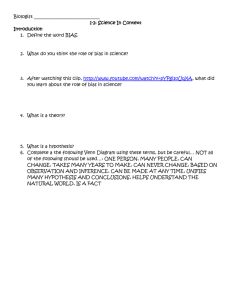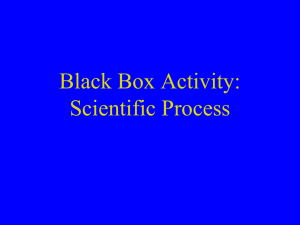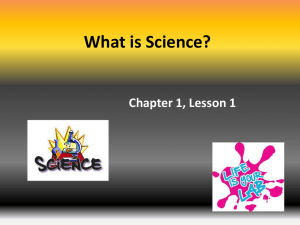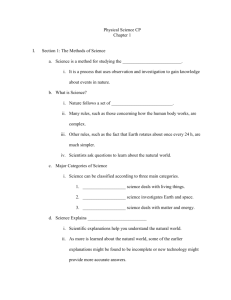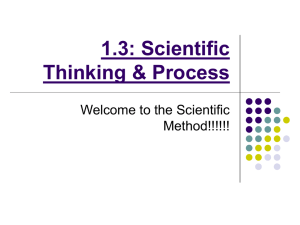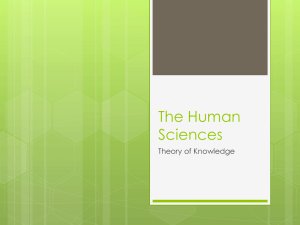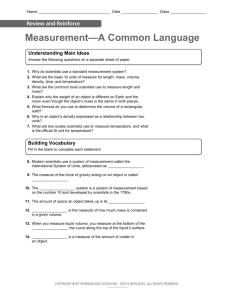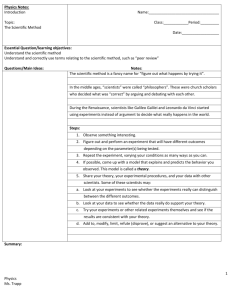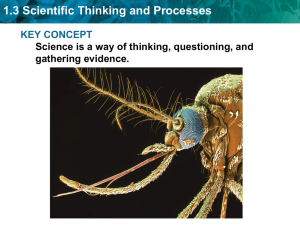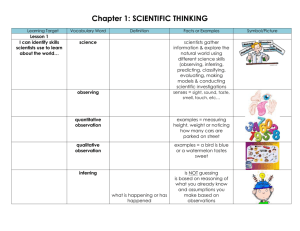Nature of Science (NOS) Test Review
advertisement
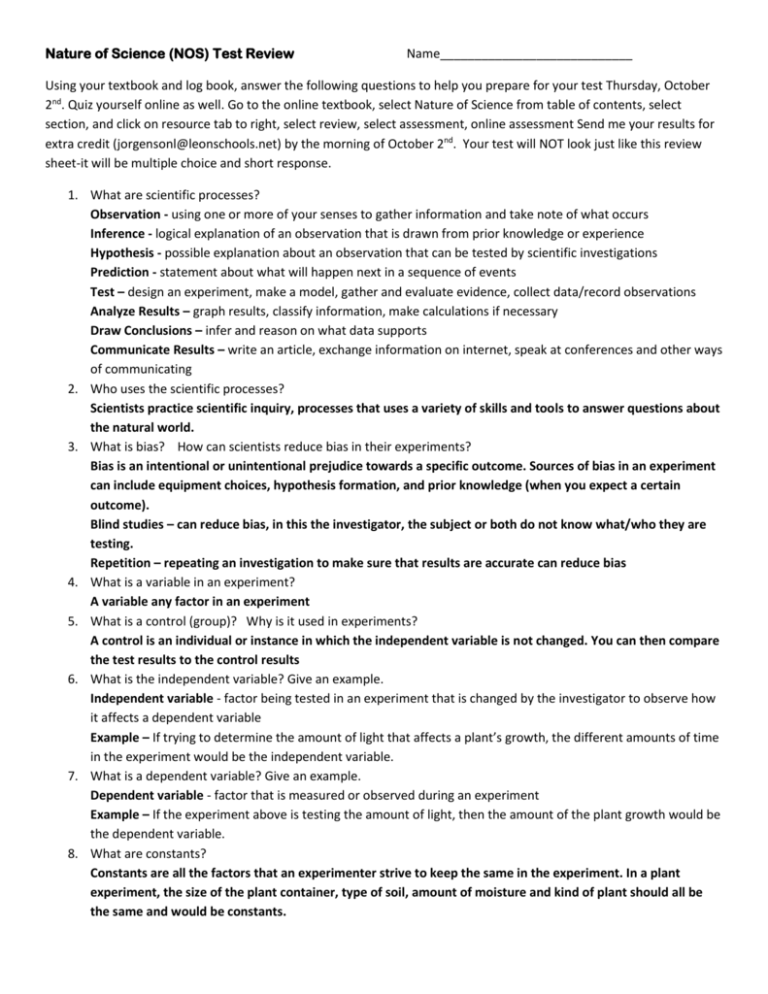
Nature of Science (NOS) Test Review Name____________________________ Using your textbook and log book, answer the following questions to help you prepare for your test Thursday, October 2nd. Quiz yourself online as well. Go to the online textbook, select Nature of Science from table of contents, select section, and click on resource tab to right, select review, select assessment, online assessment Send me your results for extra credit (jorgensonl@leonschools.net) by the morning of October 2nd. Your test will NOT look just like this review sheet-it will be multiple choice and short response. 1. What are scientific processes? Observation - using one or more of your senses to gather information and take note of what occurs Inference - logical explanation of an observation that is drawn from prior knowledge or experience Hypothesis - possible explanation about an observation that can be tested by scientific investigations Prediction - statement about what will happen next in a sequence of events Test – design an experiment, make a model, gather and evaluate evidence, collect data/record observations Analyze Results – graph results, classify information, make calculations if necessary Draw Conclusions – infer and reason on what data supports Communicate Results – write an article, exchange information on internet, speak at conferences and other ways of communicating 2. Who uses the scientific processes? Scientists practice scientific inquiry, processes that uses a variety of skills and tools to answer questions about the natural world. 3. What is bias? How can scientists reduce bias in their experiments? Bias is an intentional or unintentional prejudice towards a specific outcome. Sources of bias in an experiment can include equipment choices, hypothesis formation, and prior knowledge (when you expect a certain outcome). Blind studies – can reduce bias, in this the investigator, the subject or both do not know what/who they are testing. Repetition – repeating an investigation to make sure that results are accurate can reduce bias 4. What is a variable in an experiment? A variable any factor in an experiment 5. What is a control (group)? Why is it used in experiments? A control is an individual or instance in which the independent variable is not changed. You can then compare the test results to the control results 6. What is the independent variable? Give an example. Independent variable - factor being tested in an experiment that is changed by the investigator to observe how it affects a dependent variable Example – If trying to determine the amount of light that affects a plant’s growth, the different amounts of time in the experiment would be the independent variable. 7. What is a dependent variable? Give an example. Dependent variable - factor that is measured or observed during an experiment Example – If the experiment above is testing the amount of light, then the amount of the plant growth would be the dependent variable. 8. What are constants? Constants are all the factors that an experimenter strive to keep the same in the experiment. In a plant experiment, the size of the plant container, type of soil, amount of moisture and kind of plant should all be the same and would be constants. 9. Not all scientists work in labs and perform experiments. What are some other ways scientists do science? Field Study - A scientific study of free-living plants or animals in which the subjects are observed in their natural habitat without changing, harming, or altering the setting or subjects. Systematic Observation - The skill of recognizing and noting some fact or event in the natural world and then observation which often includes the act of measuring Controlled Experiment - Usually a lab investigation in which the values of all variables are kept the same except for one that is changed from experiment to experiment (independent variable) and one that is measured (dependent variable). Models - A simplified representation of a system. Models are useful for studying systems that are too big, too small, or too dangerous and too complex to study directly. 10. Why do scientists share what they have learned? Communicating results is important so that other scientists can use new information in their research or verify investigations that they complete. 11. How do they share what they have learned? Scientists communicate by writing an article, exchange information on internet, speak at conferences and other ways of communicating. 12. What is the difference between a theory and a law? Which of these changes more often with new information or discoveries? A scientific theory is an explanation of observations or events based on knowledge gained from many observations and investigations. Theories have Multiple lines of evidence Have been tested over time Have not been disproven Are agreed upon by a high percentage of scientific experts in the field of study A scientific law describes a pattern or an event in nature that is always true. Describe what will happen every time in given conditions Theories are modified as new information or discoveries add to our knowledge base. 13. What is technology? The practical use of scientific knowledge that enables humans to function better (not necessarily something that is plugged in or has a battery!) 14. Give 2 examples of technology. A pencil, a paperclip 15. What is a hypothesis? A possible explanation about an observation that can be tested by scientific investigations 16. Ms. J is trying to determine whether she should use fertilizer on her tomato plants. She decides to do an experiment to see if using fertilizer affects the plants’ growth. Give a sample hypothesis What is the independent variable? What is the dependent variable? What constants does she need in this experiment? Will she need a control group? If so, what plants will be in that group? 17. Why do scientists use data tables? Data tables allow scientists to compare results easily, to identify patterns or trends more easily and condense results in to easily read information 18. Units review: Indicate the best basic (metric) unit for measuring: (meter, liter, gram) Distance to classroom door - Meter A bottle of soda – liter Mass of a pencil - gram Length of the lab table – meter/cm Temperature – Kelvin/Celsius 19. What is the density of a rock if the mass is 50 grams and the volume is 5 mL? (Use d=m/v) *see me if you need help with this Density =m/v would be 50/5=10 grams 20. What is the difference between precision and accuracy? (see pg. 14 in your book) Accuracy indicates how close a measurement is to an accepted value. Precision is how close measurements are to each other. 21. Use your frame to review theory, law and hypothesis. Write a sentence that describes how these terms are similar and different.
